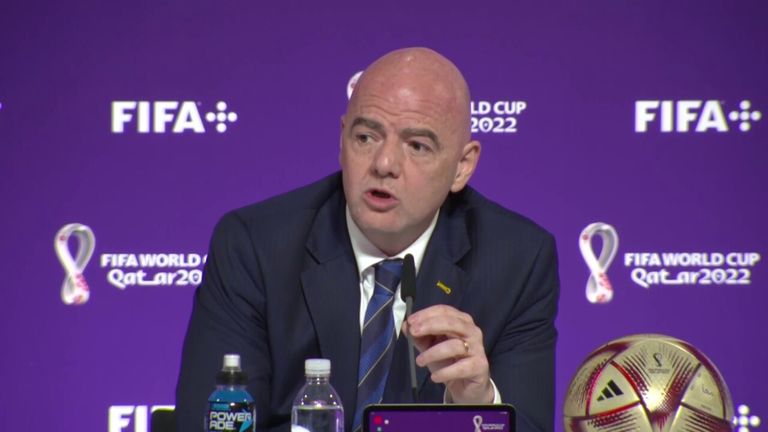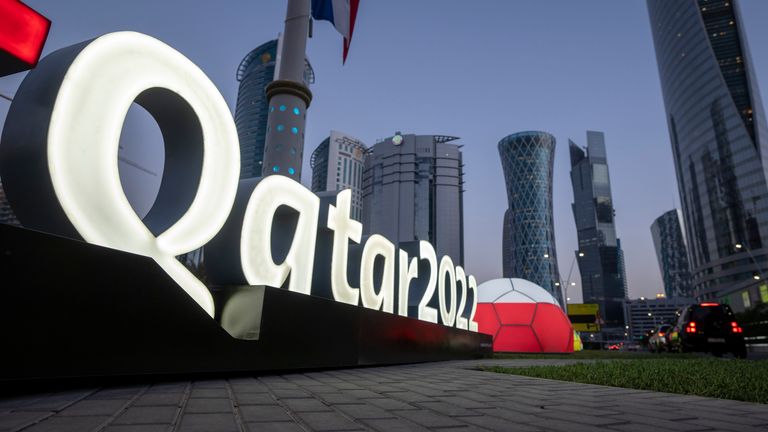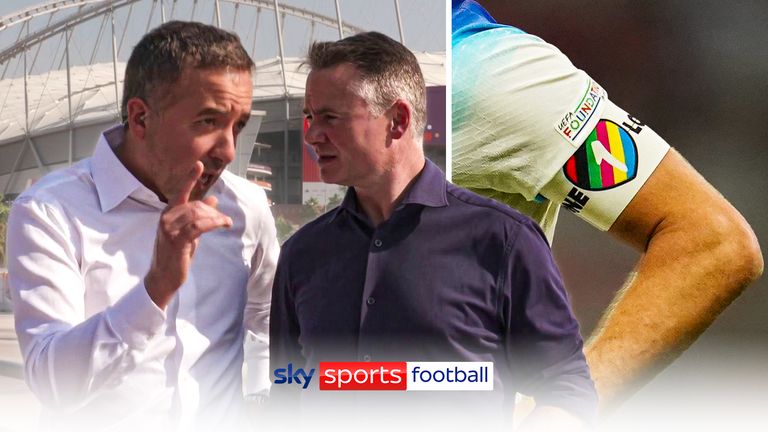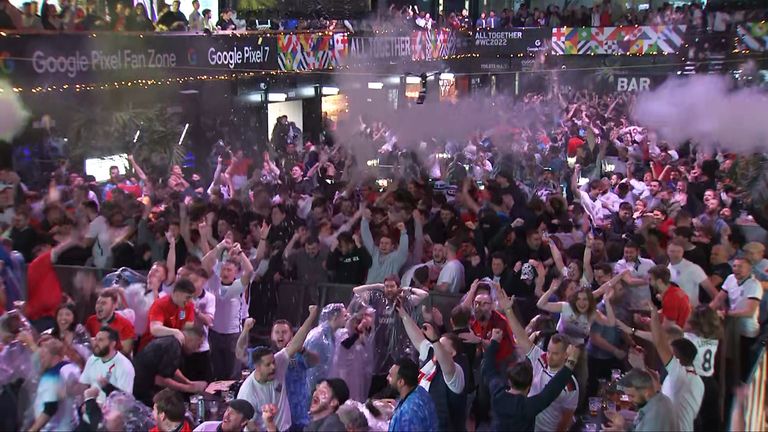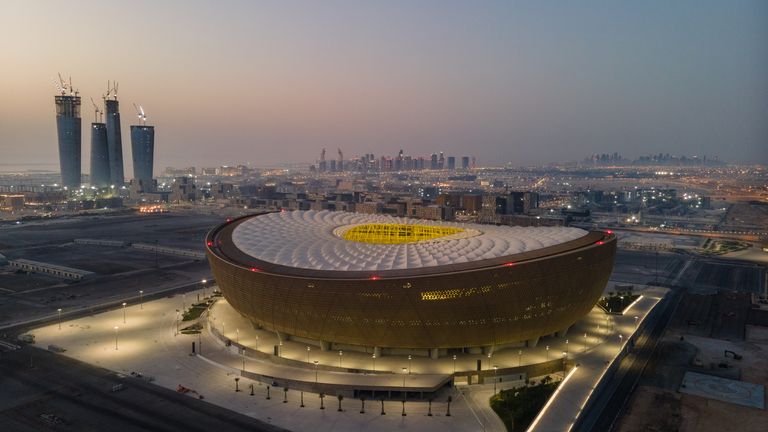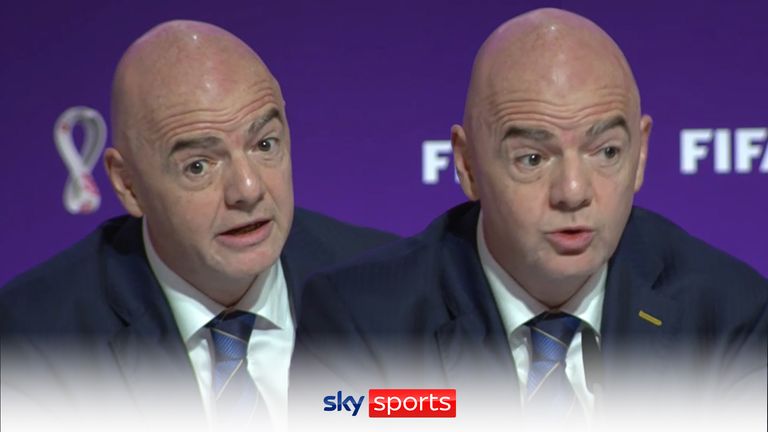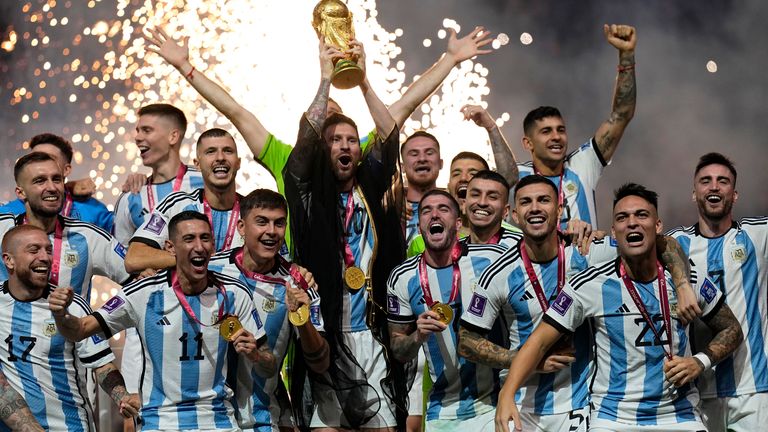[ad_1]
The first World Cup in the Middle East, the first in a Muslim country, the first in mid-winter, the first to be alcohol-free in stadiums, the first to see no arrests of any UK citizens. This World Cup has been unique.
The showpiece final was possibly the greatest showpiece of them all. An extravaganza of footballing drama that went all the way, lurching sometimes towards France, sometimes towards Argentina.
And a fairytale finish for Messi the maestro, whose place in footballing folklore is assured.
Human rights issues under the spotlight
But, off the pitch, as we’ve seen with many big tournaments in the past, this World Cup has been far from immune from world politics.
There was a very short build-up to the tournament. Instead of a warm-weather training camp and a couple of friendly matches, England had five training days before their opening group B game against Iran.
Nevertheless, the build-up to the first game – and in truth, beyond that too – saw a news agenda dominated as much by human rights as it was the formation that Gareth Southgate might adopt for the opening game.
For months – in fact, several years – before the event in Qatar started, column inches were being written and questions were being asked about the huge numbers of migrant workers who had died whilst building the stadiums and tournament infrastructure.
Estimates of the true number of deaths varied – from 15,000 according to Amnesty, 6,500 from the Guardian, and the three work-related deaths according to the Supreme Committee who organised this tournament.
What was clear to us as journalists working in Qatar was that the vast majority of those imported construction workers had been moved out of Doha for the duration of the World Cup.
Huge projects – including one for a massive new hotel in the luxurious Pearl area of the Doha coastline – lay dormant and noiseless while we conducted interviews with Gary Neville and other ex-footballers alongside the nearby beach.
Out of sight, out of mind. That was clearly the thinking. And when FIFA organised a ‘meet-the-migrant-workers’ choreographed photocall at England’s team base in Al Wakrah, it was a hugely awkward and fully choreographed event.
Southgate and the whole squad turned out to do a short training session with a group of 20-or-so hand-picked and FIFA-vetted migrant workers, who were all given England shirts and top-value tickets to England versus Wales.
It felt like the FA had been duped too by this FIFA publicity stunt. These weren’t penniless construction workers, made to work in incredibly high temperatures with little regard for health and safety, trying to scrape a measly wage to send back to loved ones abroad.
The one ‘migrant worker’ we were allowed to interview spoke glowingly of the health and safety measures in place in Doha, how much the Supreme Committee cared about the workers, and how the international media had got it all wrong.
It turned out that the interviewee was an entrepreneur, who owned a health and safety business in Saudi Arabia, who had won a contract with the Supreme Committee to oversee work practices in Doha. In short, a stooge. A fairly wealthy stooge who was delighted with his free England shirt and free tickets to a big World Cup game.
Then there was the shambles of the OneLove armband, which had been hailed as a key symbol of support for the LGBTQ+ community, by the nine European nations who were determined their captains would wear it during games in Qatar.
Determined, that is, until at the 11th hour, FIFA threatened them with possible player suspensions if they wore them.
So they all backed down. The German national team made a powerful “gagging” gesture, by putting their hands over their mouths for the team photo before their opening game defeat to Japan.
The English FA, wrong-footed and fuming at FIFA, lit the Wembley arch in rainbow colours. It seemed a very distant echo of a protest, 4,000 miles away from the tournament, and a world away from a country in which no LGBTQ+ England fans felt comfortable to travel to.
A diverse England fanbase with no arrests
In fact, the fanbase was very different inside the Doha stadiums from any other World Cup we have seen. Accusations of ‘fan actors’, who’d been paid by FIFA to attend, were quickly dismissed.
Gianni Infantino called it racist (and in this he was probably correct) for people to assume that, just because the England support looked very different from the typical England travelling support, they were not ‘real’ fans.
Most were ex-pats or England fans that lived outside England. Many from Asia, or the Middle East. But no less England fans.
The vast majority of UK-based England fans couldn’t afford to come to Qatar to watch. With hotel prices typically in excess of £500 per night, and beer prices more than £12 a bottle in the few hotels you could buy it – it seemed unaffordable and unattractive to many.
So England’s ‘new’ fanbase created a very different atmosphere around England’s games. The atmosphere was less passionate for sure, more polite. But England’s support had never looked so diverse.
Only the game versus Wales felt like a ‘normal’ England game, similar in atmosphere to what you might have seen at previous tournaments, with many supporters travelling from the UK for that one.
But hardly any of them were drunk. I spoke regularly to senior UK police officers stationed alongside the Qatar authorities. They were almost entirely redundant, and a bit embarrassed to be here.
There was not a single arrest of a UK national throughout the whole tournament – the first time that has ever happened.
The lack of alcohol was of course a huge factor. Two days before the opening game of the World Cup, there was a complete U-turn on the alcohol policy for the tournament. For years, the plan had been communicated that Qatar would relax its strict ban on alcohol inside stadiums.
Now, at the very last minute, the Supreme Committee had flexed its muscles, and FIFA changed its mind – upsetting Budweiser, a key sponsor, who quickly deleted a tweet on its official account that said “Well, this is awkward…”
It felt, even before the World Cup had started, that maybe FIFA wasn’t running its own tournament. Clearly, the Qatar authorities held a lot of the power.
By the way, alcohol was still available in corporate hospitality boxes at games. The starting price for those suites was £19,000.
Doubts remain over most sustainable World Cup
The stadiums themselves were extraordinary and magnificent. When money is no object, you can spend extra on making each one distinct and special, and that’s what Qatar did.
Let’s be honest, most football stadiums in the UK are ‘of a type’. We are all accustomed to the white stanchions and tiered seating. In Doha, each stadium was bespoke and beautiful. One looked like a bird’s nest. Another – the Lusail Stadium, host for the final – a giant golden fruit bowl, which glows, opulent, in the dark.
Of course, every time you walked into one of the stadiums, you wondered with a leaden heart just how many workers had suffered and died in the building of it.
But you were often quickly distracted as you dodged to the side to avoid a procession of huge blacked-out limousines drive right up to the VIP entrances, or as you watched one of the many helicopters ferrying the great and the good to the game.
What of FIFA’s promise that this would be the most sustainable World Cup ever? That it would be carbon-neutral? There has been plenty of doubt cast upon that claim, and with good reason.
The vast majority of England’s matches were staged at the Al Bayt stadium – a huge Bedouin tent-like structure to the far north of Doha, with nothing but a McDonald’s restaurant within several miles of it.
Someone described it as looking more like a shopping mall than a stadium, and that was true. A shopping mall that had air conditioning unit outlets ringed all around the top of the roof, pumping hot air from inside. But the stadium had no roof. So much of that cool air, whilst it was nice on your ankles as you sat in your seat, escaped into the atmosphere.
Next to the Al Bayt Stadium was a synthetic warm-up pitch. The huge floodlights for that were turned on before it got dark, even though it was totally unused and inaccessible by fans or officials.
Similarly, at the huge FIFA main media centre on the Doha ring road, outside lighting was on permanently, all day long, in bright sunlight and temperatures which exceeded 30 degrees Celsius.
Fans, volunteers and the media went through millions of plastic water bottles. I feel terribly guilty to admit it, but I did too. Always looking for recycling bins within the FIFA facilities and on the street, and only very rarely finding one.
Infantino’s ‘mind-boggling’ speech
And then there was Infantino’s utterly bizarre welcome speech, on the eve of the opening ceremony. It wasn’t scripted, apparently. Really?
You mean, he hadn’t planned each word of that rambling, mind-boggling diatribe?
“Today, I feel Qatari. Today, I feel gay. Today, I feel disabled. Today, I feel like a migrant worker.”
At a stroke, he ostracised anyone who truly was a part of the communities he claimed to be “like”. And then he said he understood what it felt like to be ostracised and alone, because he had been bullied for having ginger hair whilst at school. Whilst also slating the Western media for giving moral lessons to the world. Oh, the irony.
Despite all of this, Infantino will still be re-elected as FIFA president unopposed at the end of March.
And despite his misjudgments, there is a sense that the Qatar World Cup has changed the image of the Arab world in the West.
‘A real feast of football with a fairytale ending’
Thank God the football was such a pleasant distraction from all of this. And with all the stadiums within 45 minutes drive from each other – no other World Cup before or after, will enjoy that level of accessibility.
It has been a brilliant World Cup, on the pitch. A real feast of football.
There were some amazing shocks during the group stages – Japan beating Germany; Saudi Arabia humbling Argentina; Morocco finishing off Belgium. You were reminded that there is a slow but persistent “levelling-up” of abilities worldwide. That old adage that there are “no easy games” in tournament football has never been so true.
And then there was Lionel Messi, and that final.
The abiding memory of Qatar 2022 came in the final moments of the tournament, after 120 minutes and penalties (and after a ridiculous FIFA-induced delay of around 30 minutes between the final being decided, and Argentina’s captain getting his hands on the World Cup trophy).
FIFA and Infantino are lucky that most of the politics, human rights issues and failures will be forgotten because of the most perfect of footballing fairytales.
The greatest player ever, winning his first World Cup, at what is almost certainly his final World Cup.
That is what Qatar 2022 will be remembered for.
[ad_2]
Source link
